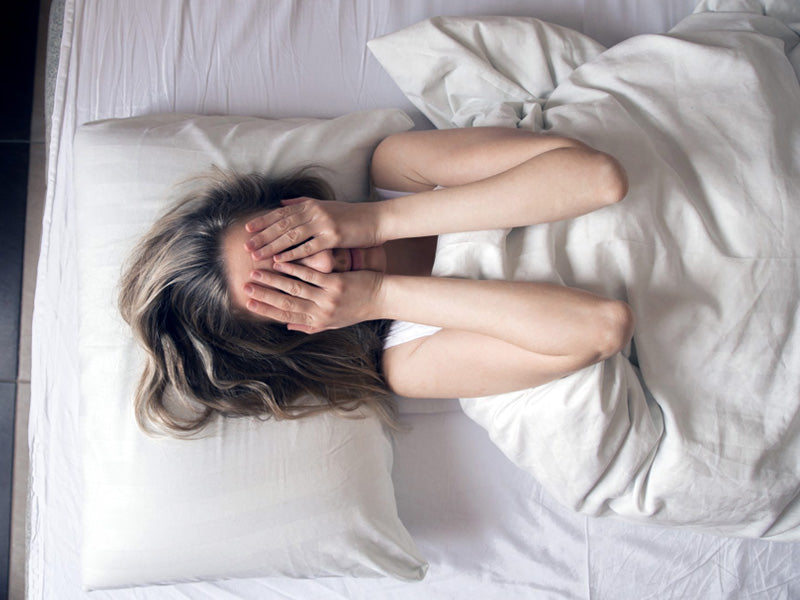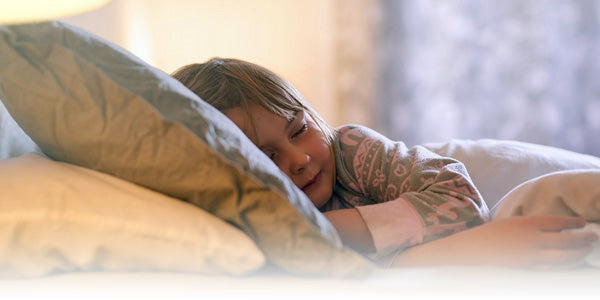Getting Good Sleep Amid the Stress of Covid 19 – Tips for Parents & Children


by Molly Ryan
Apr 02, 2020
It’s no secret that as the COVID-19 pandemic begins to spread, so does anxiety and worry. Getting a healthy amount of quality sleep probably isn’t as easy as it used to be. This makes protecting your sleep even more important as it helps keep your body and mind healthy. The question that many parents are asking now is, “How does my family get good sleep amid all this worry”? We have listed below key items to pay attention to amid chaotic times, that will improve both parent’s and children’s sleep.

Five Good Sleep Habits for Parents
- Manage your worries and control your stress. Insomnia is a normal reaction to stress. In times of uncertainty, it’s even more important to do intentional actions to control worry. Try things you haven’t tried before such as: Setting aside 20 min each day to write down your worries and problem solve. Try different forms of relaxation techniques such as peaceful moments of deep breathing that bring attention to the here and now. Sing, dance, and connect with friends virtually. The key during stressful times is understanding what you can’t control and managing your reaction to that uncertainty.
Stress.org has some great tips to manage your stress to get good sleep here: https://www.stress.org/stress-and-sleep-how-to-master-stress-and-enjoy-restful-sleep-instantly
Article Continues Below Advertisement
- Establish a regular sleep and work schedule. As tempting as it is to sleep in, take naps and stay in bed all day, these habits may be preventing you from getting the deep sleep you truly need. Getting up and going to bed at the same time each day will help parents maintain a good sleep rhythm.
How to establish a good sleep schedule here: https://www.sleep.org/articles/get-sleep-schedule/
- Create an amazing sleep environment. All aspects of a bedroom can have a dramatic effect on how well parents are sleeping. Sleepfoundation.org recommends paying attention to the small details of the bedroom that make sleeping more pleasurable. Things like keeping your bedroom cool, having fresh, clean sheets, removing technology sources from the room, and making your bed each day can all add to your overall sleep experience.
Read more on how a great bedroom is the key to better sleep: https://www.sleepfoundation.org/press-release/americans-bedrooms-are-key-better-sleep-according-new-national-sleep-foundation-poll
Article Continues Below Advertisement
- Monitor your amount of screen time and media exposure. The unusual hypervigilance to gaining the newest information about a crisis causes a state of hyperarousal and mental rumination that becomes harder and harder to stop. By intentionally limiting the amount of media you expose yourself to each day, you are limiting the sources of these sleep interrupters. Blue light from screens also lowers your sleep hormone called melatonin. Blue light exposure instructs your brain to be wakeful at night instead of allowing the melatonin to regulate better sleep. This creates a form of “social jet lag” and has a direct effect on an individual’s memory, learning abilities, behavior and mood. Researchers suggest turning off all screens at least 30 min before bedtime. https://www.sleep.org/articles/ways-technology-affects-sleep/
- Get plenty of exercise. Exercise helps reduce stress and tires you out which will naturally bolster your body’s ability to sleep. Exercising in the early morning or early afternoon may also help reset your sleep/ wake cycle by raising your body temperature slightly, then allowing it to drop and trigger sleepiness a few hours later. Exercising outdoors is especially helpful as it allows your body to soak up natural sunlight during the daylight hours.
Best exercises for sleep click here: https://www.sleepfoundation.org/articles/best-exercises-sleep
For a full list of good sleep habits for parents click here: http://sleepeducation.org/essentials-in-sleep/healthy-sleep-habits
Article Continues Below Advertisement

Three Good Sleep Habits for Babies and Children:
- Establish a consistent daily schedule. Several sleep training books center around daily routines being key to good sleep habits for children. Most center around three main segments of a child’s day: getting good nutrition at regular intervals, getting plenty of play time and exercise, and setting consistent nap and bedtimes. It’s important to set a consistent daily schedule and avoid sleep interrupters like over fatigue, lack of active playtime, and lack of full feedings.
A sample routine of how this works is explained in this video: https://babywise.life/blogs/momtalk/how-babywise-actually-works
For more information on the importance of family routines click here: https://www.healthychildren.org/English/family-life/family-dynamics/Pages/The-Importance-of-Family-Routines.aspx
Article Continues Below Advertisement
- Establish a restful sleep environment. Just like adults, children desire a comfortable sleep environment, sleep safety is also important to remember. A comfortable sleep environment includes keeping the room temperature for children between 65°-70° F and creating dim lighting. Special features like soothing room décor and calming white noise may also contribute to a positive sleep experience.
Tips for creating a sleep sanctuary for baby: https://www.parents.com/baby/sleep/tips/creating-a-sleep-sanctuary-for-your-baby/
Safe Sleeping tips for baby: https://www.cdc.gov/reproductivehealth/features/baby-safe-sleep/index.html
Tips on how to create a sleep environment for toddlers: https://www.sleep.org/articles/design-a-sleep-friendly-bedroom-for-your-child/
- Establish a consistent bedtime routine. Every child responds to outside cues of influence that helps them understand that there is going to be a transition in their schedule. Small events such a seeing an adult set the table signaling a meal is ready to eat, instantly prepares them for the next event in the day’s schedule. The same is true for sleep routines. Warm baths, soft lighting, soft music, changing into pajamas, reading a book, brushing your baby’s gums/teeth and family cuddles all help signal a child that the day of play has come to an end and that it’s time for sleep. Keeping this routine easy to execute, easy to repeat and consistent are the keys to helping baby understand that it’s bedtime.
Tips on how to establish baby’s nighttime routine: https://www.whattoexpect.com/first-year/baby-sleep-schedule.aspx
For a list of bedtime routine do’s and don’ts click here: https://www.verywellfamily.com/kids-and-bedtime-routines-2634260
For a more comprehensive guide and sleep tips check out babywise.life: https://babywise.life/blogs/momtalk/tagged/sleep
Molly Ryan
Molly is a mom of 5, grandma of two and a baby product expert. For the last 23 years she has enjoyed connecting parents to products and resources that help make their parenting journey uniquely theirs.





